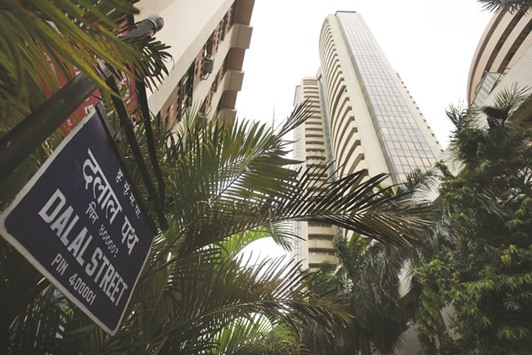Indian stocks dropped the most in a month amid losses in emerging-market equities and as investors turned cautious before lawmakers began debating the unified sales tax bill.
The S&P BSE Sensex closes 1.02%, or 284.20 points, down at 27,697.51 yesterday. A gauge of mid-cap stocks had its steepest drop in more than five months, with property developers and automakers ending in the red.
The Sensex last week capped its fifth month of gains last week, fuelled by $1.7bn of foreign inflows in July, and the mid-cap index rose to a record on Monday as the government inched closer to getting clearance for the passage of the goods-and-services tax bill. The advance sent valuations of the medium-sized companies to levels last seen in early 2008, a year that saw Indian equities suffer their worst-ever annual loss.
“The GST news is fully in the price and our valuations are high,” said Chokkalingam G, managing director at Mumbai-based Equinomics Research & Advisory. A gauge of global stocks declined for a third day as a rebound in European banks failed to trigger a broader recovery.
Emerging markets sank and the ringgit weakened with crude holding below $40 a barrel. The MSCI AC Asia Pacific Index plunged 1.9%.
India’s upper house of parliament began debating on the GST bill, ending a decade-long wait for the passage of India’s biggest tax reform. The lawmakers will vote on the bill, which has already been passed by the lower house. Once implemented, the tax will go a long way in fulfil Prime Minister Narendra Modi’s pledge to make it easier to do business in the world’s fastest-growing big economy.
The levy can boost economic growth by as much as 2 percentage points, according to Finance Minister Arun Jaitley. The benefits will start to show up gradually in the year starting April 1, 2017.
Tata Motors, owner of Jaguar Land Rover, and Maruti Suzuki India, the largest carmaker, were among the top losers on the Sensex. ITC declined the most since April, while Hindustan Unilever, the biggest household products maker, fell for the first time in six days.
Power Grid Corp slid the most in two weeks. Housing Development Finance Corp declined for a fourth day. Reliance Industries, owner of the world’s largest refining complex, retreated 1.9%. Larsen & Toubro, the largest engineering company, decreased to a five-week low.
The Sensex is valued at 16.1 times 12-month estimated earnings, near the highest since April 2015. A gauge for emerging-markets nations trades at a multiple of 12.1, data compiled by Bloomberg show.
Meanwhile the rupee weakened against the US dollar yesterday. The home currency closed at 66.99 a dollar, down 0.38% from its previous close of 66.74. The rupee opened at 66.70 a dollar and touched a high and a low of 66.70 and 67.01, respectively.
So far this year, the rupee is down 1.25%, while foreign institutional investors (FIIs) have bought $4.78bn in equity and sold $1.06bn in debt markets.
India’s 10-year bond yield closed at 7.195%, as compared with its Tuesday’s close of 7.177%.
Asian currencies closed lower as investors pared back on emerging market assets with falling oil prices and ahead of the US non-farm payroll data.
South Korean won was down 0.66%, Malaysian ringgit 0.59%, Thai baht 0.52%, Japanese yen 0.29%, Indonesian rupiah 0.24%, Singapore dollar 0.2%, Taiwan dollar 0.15%, China offshore 0.06%, China renminbi 0.06%, Philippines peso 0.05%.
The dollar index, which measures the US currency’s strength against major currencies, was trading at 95.25, up 0.2% from its previous close of 95.064.

The Bombay Stock Exchange building is seen in Mumbai. The S&P BSE Sensex closed down 284.20 points to 27,697.51 yesterday.
